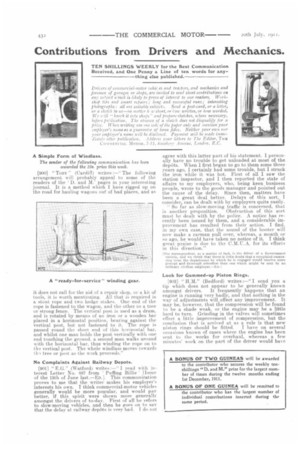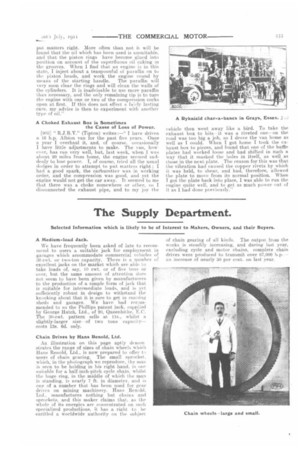Contributions from Drivers and Mechanics.
Page 18

Page 19

If you've noticed an error in this article please click here to report it so we can fix it.
TEN SHILLINGS WEEKLY for the Best Communication Received, and One Penny a Line of ten words for any thing else published.
Drivers of commercial-motor vehic es and tractors, and mechanics and foremen of garages or shops, are invited to send short contributions on any subject which is likely to prove of interest to our readers. Work. shop tips and smart repairs ; long and successful runs; interesting photographs : all are suitable subjects. Send a post-card, or a letter, or a sketch to us—no matter h w short, or how written, or how worded.
We knock it into shape" and prepare sketches, where necessary, before publication. The absence of a sketch does not disqualify for a prize. When writing use one side of the paper only and mention your employer's name as a guarantee of bona fides. Neither your own 110r your employer's name will be disclosed. Payment will be made inime• diatelv after publication. Address your letters to The Editor, TH CO \INIERCIAI, Moroi?. 7-15. kosebery Avenue, London, E.C.
A Simple Form of Windlass.
Tlw sender of the following communication has been awarded the 10s. prize this week.
[900] "Tony" (Cardiff) writes :—" The following arrangement will probably appeal to some of the readers of the '1). and M.' pages in your interesting journal. It is a method which I have rigged up on the road for hauling wagons our of bad places, and as it does not call for the aid of a repair shop, or a kit of tools, it is worth mentioning. All that is required is a stout rope and two hedge stakes. One end of the rope is fastened to the wagon, and the other to a tree or strong fence. The vertical post is used as a drum, and is rotated by means of an iron or a wooden bar placed in a horizontal position, bearing against the vertical post, but not fastened to it. The rope is passed round the short end of this horizontal bar, and whilst one man holds the post vertically with one end touching the ground. a second man walks around with the horizontal bar, thus winding the rope on to the vertical post. The whole windlass moves towards tiv tree or post as the work proceeds."
No Complaints Against Railway Depots.
[801] "E.G." (Watford) writes :—" I read with interest Letter No. 887 from ' Puffing Billie [Issue of the 15th of June last.—En.], This communication proves to me that the writer makes his employer's interests his own. I think commercial-motor vehicles generally would be more popular, and would pay better, if this spirit were shown more generally amongst the drivers of to-day. First of all he refers to slow-moving vehicles, and then he goes on to say that the delay at railway depots is very bad. I do not agree with this latter part of his statement. I personally have no trouble to get unloaded at most of the depots, When I first began to go to them some three years ago, I certainly had some trouble, but I struck . the iron while it was hot. First of all I saw the station inspector, and I then reported the state of affairs to my employers, who, being keen. business people, wrote to the goods manager and pointed out the cause of the delay. Since then, matters have been a great deal better. Delays of this sort, I consider,, can be dealt with by employers quite easily.
" So far as slow-moving traffic is concerned, that
is another proposition. Obstruction of this sort must be dealt with by the police. A notice has recently been issued by them, and a considerable improvement has resulted from their action. I find, in my own case, that the sound of the hooter will now make a carman pull over, whereas, a month or so ago, he would have taken no notice of it. I think great praise is due to the C.M.C. A. for its efforts in this direction."
fOor correspondent. as a matter of fact, is the driver of a Government vehicle, and we think that there is little doubt that a complaint emanating trout the department by which he is engaged AVOIIICI receive more prompt and thorough attention than one which might be sent by an ordinary civilian employer.—En. I
Look for Gummed-up Piston Rings.
[902] " H.M." (Bedford) writes :—" I send you a tip which does not appear to he generally known
amongst drivers. It frequently happens that an engine is running very badly, and that nothing in the way of adjustments will effect any improvement. It. may be, however, that tEe compression will be found to be a shade weak, or the engine may be a little hard to turn, Grinding in the valves will sometimes effect a little improvement of compression, but the conclusion that is arrived at as a rule is that new
piston rings should be fitted. I have on several occasions known of cases where the engine has been sent to the works for overhaul, whereas a few minutes work on the part of the driver would have
put matters right. More often than not it will be found that the oil which has been used is unsuitable, and that the piston rings have become glued into position on account of the superfluous oil caking in the grooves. When I find that an engine is in this state, I inject about a teaspoonful oF paraffin on to the piston heads, and work the engine round by
means of the starting handle. The paraffin will very soon clear the rings and will clean the walls of the cylinders. It is inadvisable to use more paraffin than necessary, and the only remaining tip is to turn the engine with one or two of the compression cocks open at first. If this does not effect a fairly lasting cure, ray advice is then to experiment with another type of oil."
A Choked Exhaust Box is Sometimes the Cause of Loss of Power.
[903] " R.J.B.V." (Tipton) writes :—" I have driven a 16 h.p. Albion van for the past five years. Once a year I overhaul it, and, of course, occasionally I have little adjustments to make. The van, however, has run very well, but, last week, when I was about 20 miles from home, the engine seemed suddenly to lose powerI, of course, tried all the usual dodges in order to attempt to put matters right: I had a good spark, the carburetter was in working order, and the compression was good, and yet the -engine would not get the car away. It. seemed to me that there was a choke somewhere or other, so I disconnected the exhaust pipe, and to my joy ihe vehicle then went away like a bird. To take the exhaust box to bitsit was a riveted one—on the road was too big a job, so I drove the van home as well as I could. When I got home I took the exhaust box to pieces, and found that one of the bailie plates had worked loose and had shifted in such a way that it masked the holes in itself, as well that those in the next plate. The reason for this was that the vibration had caused the copper rivets by which it was held, to shear, and had, therefore, allowed the plate to move from its normal position. When got the plate back into place, I was able to run the engine quite well, and to get as much power nut of it as I had done previously."




















